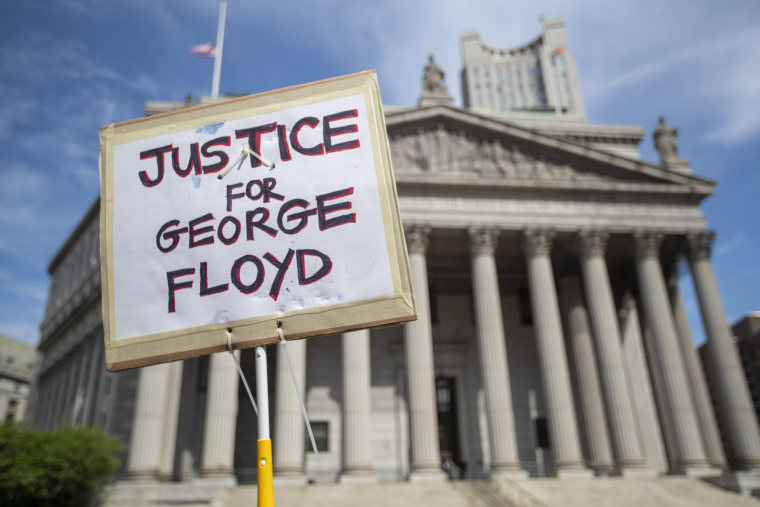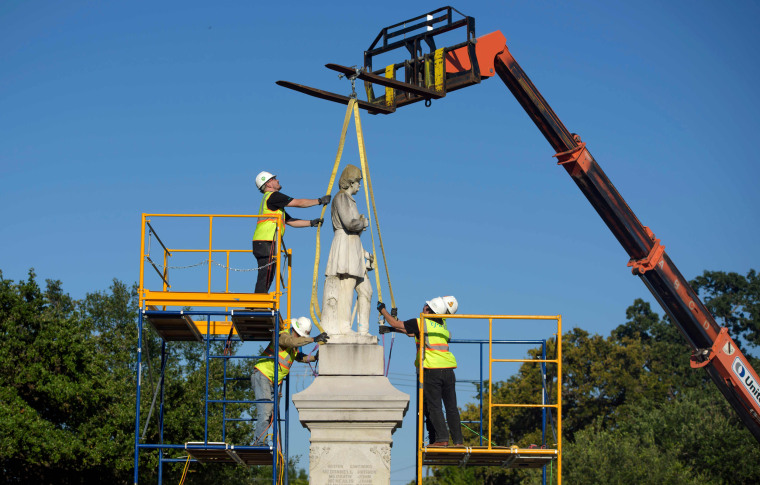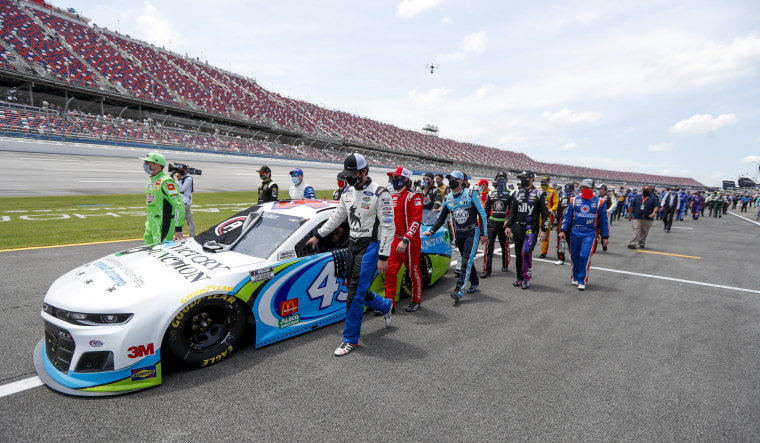Thursday is one month since the killing of George Floyd, and the nation's political and cultural landscape already look vastly different than they did Memorial Day.
In the last 31 days, millions of protesters across the United States and beyond have taken to the streets in the midst of the coronavirus pandemic, galvanized by the almost eight-minute video footage showing then-Minneapolis police officer Derek Chauvin, who is white, digging his knee into the neck of Floyd, 46, a black father of five, on May 25. The resulting uproar has crystalized into a broad movement and forced a national examining of just how deep systemic racism runs in the country.
This surging Black Lives Matter movement has already brought major change in a short time — including momentum for police reform, criminal charges against officers involved in other deaths, and the toppling of historic symbols of racism previously put on a literal pedestal by many white Americans.
"It feels as though people are literally gasping for air as if it's a metaphor for what George Floyd was going through" in his last seven minutes and 46 seconds, Mark Anthony Neal, chairman of the Department of African and African American Studies at Duke University, said. "The pace of change that we've seen — some of it substantive, some of it symbolic — we've never seen that happen in this country the way we've seen it happen in the last month."

What started as protests in cities across the nation — many of which were marked by clashes with law enforcement, tear gas, and the mobilization of 17,000 National Guard troops — have led to more peaceful and sustained movement to reform or "defund" the police. In Minneapolis, where Floyd was killed, for example, a judge ordered the city police to stop using chokeholds, while the City Council pledged to dismantle the entire department. Politicians in other cities and states have also moved forward with promises of greater civilian oversight of police, chokehold bans, and limiting access to military-grade weaponry.
Just how far the institutional changes will ultimately go, however, is an open question. That's especially true at the federal level, as shown by the wide partisan gulf between the competing bills on police reform from the GOP-controlled Senate and the Democratic-controlled House.
"The biggest impact has been in the shift in the attitude of the public," Dennis Kenney, a professor at the John Jay College of Criminal Justice, said. "Beyond that, there has been a lot of talk about reform. We've talked about abolishing some police agencies, we've talked about reassigning activities, we've talked about accountability.
"So, I'm not really sure I've seen anything that would constitute substantive reform — but there's optimism if the pressure continues."
There have been some more tangible results: Pressure from the protests led to criminal charges against Chauvin and three more officers in connection with Floyd's killing -- they have all been fired. After months of protests in Louisville, Kentucky, over another police-involved fatal shooting with racial overtones, one of the three officers involved in the killing of Breonna Taylor has now been fired. In Atlanta, one officer has been fired and two are facing charges in the fatal shooting of Rayshard Brooks after an escalation over a blocked Wendy's drive-through.
The Black Lives Matter movement has simultaneously drawn attention to the nation's troubled history.

At least 67 statues of Confederate leaders and historical figures associated with slavery have been removed across the country in the last month. There has been a push to rename U.S. Army bases named after Confederate military leaders — though President Donald Trump has stated he will "not even consider" any attempts to do so.
NASCAR, often dismissed as the least diverse of the major sports, proved an unlikely standard bearer for change by banning the Confederate flag from its events. On Monday, Bubba Wallace's fellow drivers marched alongside his race car at the Talladega Superspeedway in Alabama in an unprecedented show of unity after a noose was reportedly discovered in the garage assigned to the only black competitor on the circuit. The FBI would later rule out a crime in the incident, citing video evidence which shows the rope had been in the stall months before it was assigned to Wallace, but that doesn't dilute the symbolism of the moment.
"When I looked up and saw those guys pushing that race car out, it brought tears to my eyes because it made me realize that when I walk to that garage area, that’s my home, I’m welcome there," Brad Daugherty, the only Black team owner in NASCAR and a former NBA All-Star, told NBC News during a conference call Thursday.

"When I saw the King (82-year-old NASCAR legend Richard Petty) walking down the pit road there, it warmed my heart because he’s from a previous generation and the expectations wouldn’t probably be as high as they should be or would be for me," Daugherty, who is the co-owner of the JTG Daugherty Racing team, added.
"But when I saw him walking down, and I saw his statement (of solidarity), I said, 'Man, we’re rolling.'"
This historical month of change has reached all the way to kitchens and living rooms across the country. Quaker Oats announced June 17 that it was rebranding its Aunt Jemima syrup after 130 years in recognition that the fictional character was a racist trope. Hours later, Mars Inc. announced it would "evolve" the brand of its popular, but controversial, Uncle Ben's Rice. The long-running reality television series "Cops" was abruptly canceled earlier this month after 32 seasons.
"These are symbols that have been under siege for decades that suddenly corporate entities decide to make disappear within a matter of days," Neal said. "That's been astounding."
Experts say it's just the beginning — with the reverberations likely to continue well past the November presidential elections. The size of the protests may dwindle depending on any surge in COVID-19 cases, but the movement is already evolving its own brand.
"I do think we will continue to see come like an evolution in interest, and in tactics being used with, you know, with folks beginning to kind of embrace a much more explicit electoral posture, that is about recognizing that much of the demands that we're making will be realized or not depending on the outcome of the next election, " Seft Hunter, director of Black Led Organizing for Community Change, told MSNBC.
"And so I absolutely see the mobilization, continuing through the end of the year."